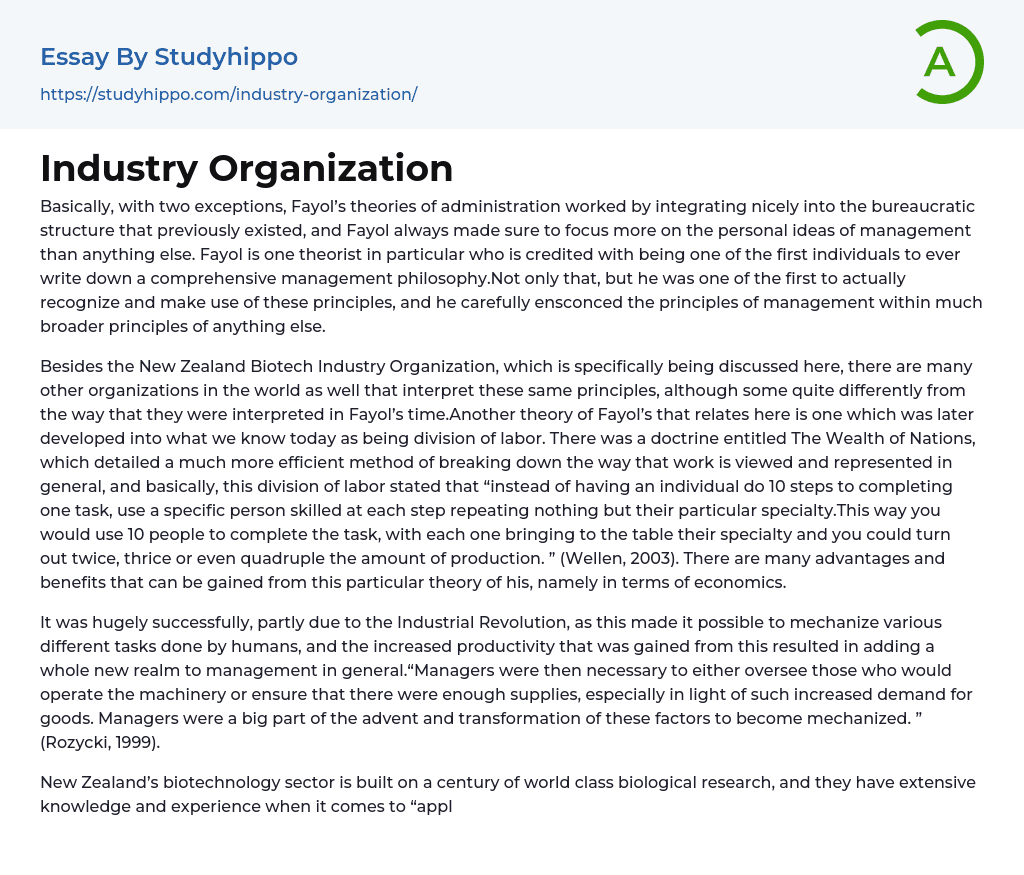In essence, aside from two deviations, Fayol's administrative theories harmoniously assimilated into the pre-existing bureaucratic structure, while his management perspective remained an essential focal point. Regarded as one of the pioneers to formulate a comprehensive management philosophy, Fayol recognized and implemented these principles, and seamlessly intertwined them with broader principles.
Discussing specifically the New Zealand Biotech Industry Organization, it should be noted that there are many other organizations worldwide that interpret these principles similarly, though some have differing interpretations from those of Fayol's time. One of Fayol's related theories is the concept of division of labor, which has since evolved into more efficient methods of work delegation.
In fact, The Wealth of Nations doctrine provides a more streamlined method of approaching work processes. The theory suggests using skilled individuals who specialize in specific ta
...sks instead of having one person complete all steps. This approach allows for increased productivity when utilizing multiple individuals with specialized skills to work together. This principle has advantages and benefits, particularly in terms of economics.
According to Rozycki (1999), the success of the Industrial Revolution was largely attributed to the ability to mechanize tasks previously done by humans. This increased productivity and resulted in the emergence of a new realm of management. Managers played a critical role in ensuring the efficient operation of machinery and the availability of supplies to meet the growing demand for goods during this transformation.
According to New Zealand's Biotech Industry Organization (2006), the biotechnology sector in the country is based on extensive knowledge and experience in applying research to various fields such as pastoral and arable farming, horticulture, forestry, and human healthcare. In this regard, three of Fayol'
14 principles of administration, namely division, authority, and discipline, provide evidence of the effective principles used in this industry. Division is crucial as it allows for specialization and continuous improvement of skills and experience among employees. This is particularly evident in the New Zealand biotechnology sector and the dedication of the organization toward ensuring existing and new employees gain the necessary experience and knowledge effectively.
In terms of authority, the leaders of the New Zealand Biotech Industry Organization have the right to issue commands when necessary to ensure success and effectiveness. Discipline is also evident within the organization, as employees obey commands and follow the direction of their leaders. However, this is a two-sided principle as management must provide good leadership for employees to willingly obey. The dynamic discipline of management in organizations can be traced back to early theories like Fayol’s and requires everyone to play their role for success.
Thanks to the successful and dedicated efforts of the organization and their effective administrative theories, New Zealand is now seeing the positive results of improvements made in the primary production sector. This serves as proof that the beliefs of Fayol and other similar theorists were correct. References: New Zealand's Biotech Industry Organization. (2006). Welcome to NZBIO. Retrieved August 15, 2007, from
- Automotive essays
- Real Estate essays
- Construction essays
- E Commerce essays
- Commerce essays
- Polymers essays
- Automotive Industry essays
- Paper Industry essays
- Textile Industry essays
- Pharmaceutical industry essays
- Pharmacy essays
- Grocery stores essays
- Classical Mechanics essays
- Rail Transport essays
- Tata Motors essays
- Vehicle Brands essays
- trucks essays
- Auto Racing essays
- Harley-Davidson essays
- Suzuki essays
- Lexus essays
- Mercedes-Benz essays
- Buying Homes essays
- Futures Contract essays
- Mortgage Loan essays
- Renting essays
- Transaction Cost essays
- Building essays
- Optical Fiber essays
- Freezing essays
- Polymer essays
- Weaving essays
- American Dream essays
- Barriers To Entry essays
- Capitalism essays
- Central Bank essays
- Compensation essays
- Consumerism essays
- Economic Development essays
- Economic Growth essays
- Economic Inequality essays
- Economic System essays
- Economy essays
- Employment essays
- Export essays
- Finance essays
- Free Trade essays
- Gross Domestic Product essays
- Human Development essays
- Income Inequality essays




